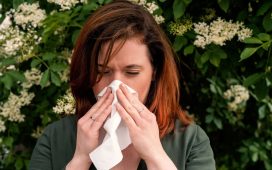Heart failure patients and over-85s are to be offered a Covid treatment that slashes the risk of hospitalisation or death from the virus by 89 per cent.
Previously, the drug, Paxlovid, was reserved for vulnerable patients with conditions that meant they did not respond to the vaccines.
These include people with blood cancers, kidney disease and organ transplant patients who take medicines which suppress the immune system.
But now the Government is planning on making Paxlovid available as an extra layer of protection to more people who are at risk of dying or being taken into hospital after getting Covid.

Heart failure patients and over-85s are to be offered a Covid treatment that slashes the risk of hospitalisation or death from the virus by 89 per cent
The treatment is a combination of two existing antiviral drugs called nirmatrelvir and ritonavir, and works by stopping the Covid virus from growing and spreading in the body.
Given as soon as possible after the patient has tested positive for the virus, one dose of the treatment – made up of two pink nirmatrelvir tablets and one white ritonavir tablet – is taken twice a day for five days.
The therapy has been shown to cut the time people suffer from Covid symptoms by about a day and may even reduce the chance of getting long Covid, which is when symptoms of Covid last for more than 12 weeks.
The NHS’s spending watchdog, the National Institute for Health and Care Excellent (NICE), is now preparing to give the green light for 1.4 million more people to get access to the drug. This will bring the number of people who are offered the treatment to over five million.
Under its plans, people will be able to take Paxlovid if they are over 85, live in a care home and are over 70, have serious heart disease or are on the organ transplant waiting list.

Previously, the drug, Paxlovid, was reserved for vulnerable patients with conditions that meant they did not respond to the vaccines
Those who can take Paxlovid can also pick up free lateral flow tests from their local pharmacy and should test themselves for Covid as soon as they start to feel unwell.
If the test is positive, they should call their GP, NHS 111 or hospital specialist for further advice.
Professor Azeem Majeed, head of the department of primary care and public health at Imperial College London, says: ‘Covid is currently circulating, and while the situation is not as serious as it was three years ago, people in these groups are still at high risk.
‘Taking Paxlovid within a few days of showing Covid symptoms will reduce their risk of having to go to hospital or dying when they get the virus, so it’s positive that the Government is making it available to more people.’











